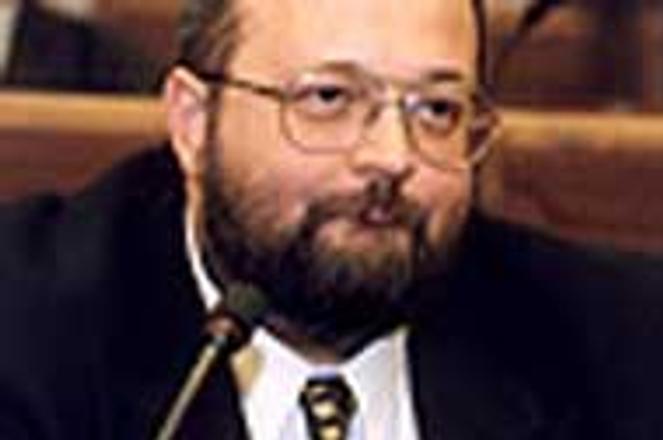Former Slovak Information Service director and HZDS deputy Ivan Lexa will likely be the next member of Parliament whose fate will be considered under the constitutional immunity clause.photo: Vladimír Hák - Profit
Constitutional reform is once again on the lips of Slovak politicians. After parliament took four long days in February to strip former Interior Minister Gustáv Krajči of his immunity from prosecution for marring a 1997 NATO referendum, representatives from almost every party were left muttering about the shortcomings of the country's most important legal document.
Krajči's case, which will soon be followed by at least two other immunity debates, has launched a discussion in parliament over whether the constitution should be modified to remove the immunity clause. Some MP's have charged that the clause puts politicians above the law, and say further that given the number of legal flaws that have been identified in the constitution since its drafting in 1992, the time is ripe for wide-ranging reform.
Details of the clause
The Slovak constitution grants members of parliament immunity from prosecution on two levels, explained Ivan Šimko, a legal expert with the majority government party, the Slovak Democratic Coalition (SDK).
The first level, Šimko said, protects members of parliament from legal harassment on the basis of their political convictions or the way they vote in parliament, and is designed to ensure their political independence.
The second level of immunity, Šimko continued, is more difficult to justify because it grants MP's a blanket release from arrest and prosecution for criminal offences unless a special parliamentary immunity committee decides otherwise.
The second immunity clause has its roots in the era directly following the 1989 fall of the communist Czechoslovak state. Back then, deputies enjoyed special privileges which would not be condoned today, such as the right to disregard speed limits and the right to import any goods into Slovakia duty free.
Šimko, who sits on a parliamentary committee which was recently convened to consider amending the constitution, stressed that modern parliamentarians should consider whether the second part of the immunity clause is consistent with Slovakia's status as a democratic nation.
"In other constitutional systems, [parliamentary] immunity is connected only with the execution of constitutional or other political functions, and doesn't apply to ordinary crimes and criminal offences," he said.
Indeed, such is the perceived need for constitutional reform in Slovakia that politicians on all sides of parliament have united to demand it. Peter Brňák, a legal expert with the opposition Movement for Democratic Slovakia (HZDS) party, also sits on the revision committee and agrees that parliamentary immunity should be limited to the first, non-criminal category.
"The first level is traditional," he explained. "It protects a parliamentary deputy from been prosecuted for his political opinions and actions." Brňák added that the second level of immunity was non-standard and "only arrived with the new constitution of the Czechoslovak Republic after the 1989 revolution."
Ladislav Orosz, a constitutional law expert with the Democratic Left (SDĽ), a reformed communist ruling coalition party, added that the wide character of immunity used by Slovak parliamentarians is far from the European vision of immunity.
Katarína Zavacká, a legal analyst with the Institute of State and Law at the Slovak Academy of Science, said that part of the problem lay in the vagueness of the constitution regarding the immunity article, and said that it appeared to make no provision for MP's who broke the law. "It simply doesn't count on the fact that a member of parliament can be immoral," she said.
Constitutional debate
The committee on which Šimko, Brňák and Orosz sit is known as the Parliamentary Committee for the Revision of the Constitution. Formed on March 2, the body has been tasked with analysing the current Slovak constitution and finding its weaknesses. The committee is supposed to submit its report in September 1999, after which time the constitution can be modified.
"We will tackle the basic problems of the Slovak constitutional system, like the immunity issue, referendum, and the questions connected with the Constitutional Court," said Orosz.
But not everyone thinks changing the text of the constitution is the best way to handle the immunity clause. Such a change might lead to MP's showing greater accountability for their actions, but it would also shake foreign confidence in the inviolability of the foremost Slovak legal document, said Luboš Kubín, a political scientist with the Slovak Academy of Science.
"The situation could be solved by a ruling by the Constitutional Court, or by some procedural agreement which would avoid changes in the constitution itself," said Kubín. He added that the "fewer changes which are made to the constitution, the better signal it sends to foreign countries."
Despite the need for a cautious approach, Kubín continued, the constitution was definitely in need of an overhaul, particularly to clarify when MP's parliamentary mandates scan be stripped. Currently, Kubín reported, a deputy can remain a member of parliament even after his immunity has been stripped, he has been prosecuted and jailed for a crime.
Brňák confirmed that in theory it would still be possible for a jailed MP to be given day passes to attend parliamentary sessions.
"This [absurdity] could be solved by creating a certain rule saying, for instance, that deputies who are sentenced to serve time in jail will be stripped of their parliamentary mandates, while those who receive suspended sentences will be allowed to retain their seats," suggested Brňák, adding that "it is, however, only one of many possibilities."
Whatever constitutional amendments Slovak MP's eventually adopt, they can be sure of one thing - the public is behind them, at least where immunity is concerned. In a poll conducted by the Institute of Public Affairs from March 4 to 6, 78% of citizens said they thought the privilege of parliamentary immunity should be suspended in cases when MP's were charged with criminal acts. Only 16% of respondents supported the clause.


